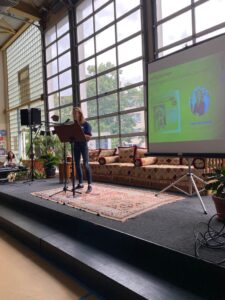
Why this symposium?
The development sector, as we know it today, has roots in our colonial history. Colonial elements still persist in the minds, attitudes, and values of development professionals, as well as in the structures of the international development system, for example, in how we set up partnerships, accountability systems & money flows or the language we use. In that sense, we recognise that decolonisation is relevant for all the work of Partos. Besides the ongoing work on Equitable Partnerships and Shifting Power, we want to address how we work on decolonisation within three of our Communities of Practices (CoP): 1) Diversity, Equity and Inclusion (DEI), 2) Inclusive Communication and 3) Climate Justice.
In this symposium, members of these three cops and other interested professionals came together at the grassroots community centre Ru Paré to celebrate and critically examine current steps and ways forward to actively free our sector and the global economic system from colonial constraints.
After an insightful presentation by Yannicke Goris (RU/formerly The Broker) based on the Partos Future Briefs: Decolonisation of the development sector and a critical reflection by Katherine Belen (Co-Founder & Executive Director Connective Paths Foundation), we had two rounds of three interesting workshops to dive deeper into the topic of decolonisation. The music of Maringo Berenos was the icing on the cake and made us connect with the issue of decolonisation not only with the head but also with the heart.
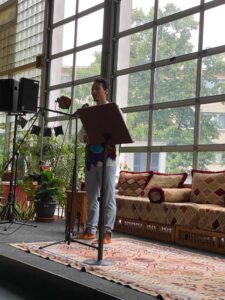
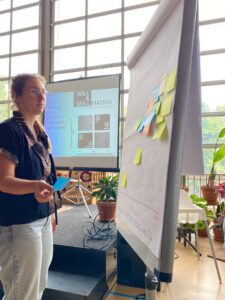
Goals and insights derived from the Workshops
Making Sense of Decolonising Diversity, Equity & Inclusion
CoP: Diversity, Equity & Inclusion Learning Trajectory
Goal: Using Diversity, Equity & Inclusion within organisations as a reference, this workshop was designed to identify what layers within our organisations and us sustain colonial injustices.
Insights:
- Decolonising DEI means identifying visible and invisible oppressive unintended effects of interventions by unpacking the mental models, assumptions & attitudes that underpin colonial practices in DEI work. The Iceberg model can be a tool to touch base with these visible and invisible elements. The workshop case of “women of colour not taken seriously” and “diversity hire burn-out” exemplifies this well.
- Focusing on equity & inclusion in our partnerships and external relations is easier than addressing (the lack of) it in our own organisation. However, no excuses.
- Discomfort may be an invisible pattern among your team or organisation. If you don’t speak about discomfort, the underlying issues rooted in injustice or privilege will also remain unaddressed.
- When discussing and working on decolonisation (and Diversity, Equity & Inclusion), we cannot shy away from racism, white saviourism and privilege. A decolonial approach must include an intersectional racial justice lens.
Inclusive Language & Communication
Goal: Reflect and give feedback on our concept Inclusive Glossary and explore guiding principles for a more just and inclusive communication practice concerning language.
Insights:
- In the words we use and the stories we create, there are often remnants of the colonial mindset and underlying power relations. To avoid reproducing unequal power relations in our language, it is essential to scrutinise them constantly.
- Exploring words and alternatives and discussing the guiding principles will help us to counter harmful narratives and working practices. We are looking for a vocabulary that acknowledges and questions power relations, that names them but also deconstructs them. Balancing this is difficult and often paradoxical, but it is also productive because it forces us to rethink respectful, balanced and critical communication and collaboration.
- In creating this glossary, we should acknowledge that this is a continuing learning process. And therefore, the glossary should be a living document in collaboration with various partners. We can’t impose inclusive language, but we can work towards a more conscious and critical reflection of our communication.
Prioritising Elements for a Joint Decolonial Climate justice narrative.
CoP: Climate Justice
Goal: Discuss and prioritise elements of a joint CoP narrative/manifest on decolonial climate Justice for systems change.
Insights:
- There is a high level of agreement on the importance of mentioning decolonial approaches as well as elements of systems change in a climate justice narrative.
- A delicate balance exists between a progressive narrative that pushes Partos/CoP members to work and collaborate for radical decolonial and feminist systems change and making sure that the majority of members agree and subscribe to such a narrative.
- The narrative, once finished, should be actively used to hold each other accountable for decolonial climate action.
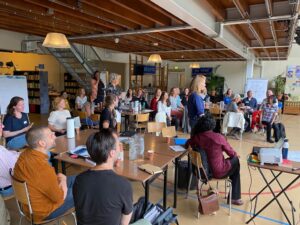
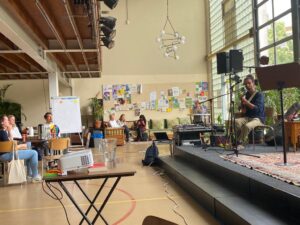
Decolonise through arts & music
Maringo Bérénos closed the day with his interpretation of what decolonisation means in art and music. Through his songs, Maringo conveys messages of inner activism, unity and connection whilst embracing historical layers that have ‘disruptively’ brought different worlds together. One of the songs performed, “Laat me zeggen” is featured in Episode 2: Schiphol of the project Langdradig, a podcast series exploring how the colonial past lives on in our presence through food, music, dance, borders and travelling.
Sharing our experiences and achievements was valuable, although discussing sensitive topics was not (and should not be) always easy. We hope and believe this symposium inspired fresh initiatives and actions on individual, organisational and sector levels that will foster systemic global change and global justice!
